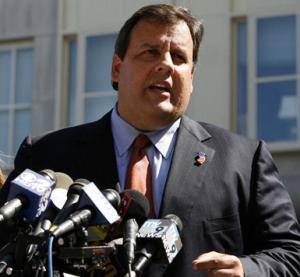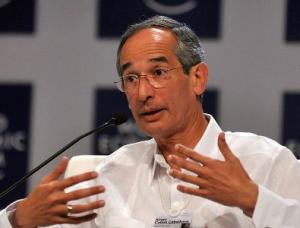New Jersey Gov. Chris Christie today shrugged off federal threats and promised to move ahead "immediately" with the state's long-delayed medical marijuana program.
We review John Gibler's To Die in Mexico: Dispatches from Inside the Drug War and find it very powerful and disturbing indeed.
We've got sticky-fingered SWAT cops, we've got perverted probation officers, we've got smack-slinging uniformed police officers, we've got strung out, pill-stealing cops, and, of course, we've got crooked jail guards.
The federal sentencing guidelines for Ecstasy offenses are too harsh and not supported by the scientific evidence, a federal district judge has ruled.
At least one Michigan legislator wants an idea of what SWAT teams in the state are up to.
A Bronx teenager was shot dead by an NYPD undercover narc as he allegedly tried to rob the officer during a crack cocaine sale.
The possession of up to a quarter ounce of marijuana is now decriminalized in La Crosse, Wisconsin. But police can still charge you with a criminal misdemeanor under state law, if they so choose.
After more than three years of controversy and challenges, the state of Hawaii has given up on trying to impose random, suspicionless drug testing on teachers.
Marijuana law reform is headed in the wrong direction in Western Australia under the leadership of the "tough on drugs" Liberal-National Party government.
Weak Central American states are hard-pressed to go up against the Mexican cartels, and now, Guatemala's president wants to build a NATO-style regional military force to go up against them. And for the US to pay for it.
Events and quotes of note from this week's drug policy events of years past.
New Jersey Gov. Chris Christie (R) announced Tuesday that he will allow the Garden State's medical marijuana program to go into effect, despite vague threats by federal prosecutors that state workers involved in implementing the program could face prosecution. Christie's decision should bring an end to nearly 18 months of delayed implementation of the program, which was signed into law by his predecessor, Gov. Jon Corzine (D).

Medical marijuana -- coming soon to the Garden State (image via wikimedia.org)
State officials will "begin work immediately" to get six Alternative Treatment Centers (
ATCs) up and running by year's end, Christie said at a Trenton
press conference. "We're moving forward with the program as it was set up," he said. "The need to provide compassionate pain relief to these citizens of our state outweighs the risk we are taking in moving forward with the program."
Christie had been accused of foot-dragging by legislators and medical marijuana supporters, who have waited with decreasing patience as the months rolled by without the program actually getting underway. First, state officials took months laboring over how to regulate the program, then Christie halted implementation of the program, saying he sought clarification from federal prosecutors on whether state officials could move ahead without fear of federal prosecution.
That in turn followed
a year of delays during which the governor first sought to delay implementation of the law, floated a proposal to limit medical marijuana dispensing to the Rutgers University medical complex (they declined), and in which the state health department twice issued draft regulations that sponsors and advocates charged would effectively make the program unworkable.
The more recent delays were understandable. Federal prosecutors in a number of states with or considering medical marijuana distribution systems have this year sent
threat letters to state officials warning that any distribution of medical marijuana remained a crime under federal law and that anyone involved in it -- including state officials -- could be subject to prosecution. Those letters were followed late last month by a
Justice Department memo from Deputy Attorney General James Cole that seemed to indicate a tougher line from the Obama administration on large medical marijuana providers, pulling back from a previously stated (though imperfectly implemented) position that medical marijuana suppliers acting in accordance with state laws were not suitable targets for federal prosecutors.
The Cole memo, however, did not mention state employees. Despite the lack of explicit of reassurance on the matter, Christie decided to move forward anyway. "After reading both the letter from Deputy Attorney General Cole and also reading remarks from then-candidate Barack Obama, and most importantly, the way we've set up the program, I have decided to move forward as expeditiously as possible to implement the medical marijuana program in New Jersey as outlined," he vowed.
The New Jersey medical marijuana program will allow patients suffering from specified illnesses or conditions to use marijuana with the approval of a physician. The law will create a registry of patients and a system of six
ATCs scattered across the state. It will be administered by the state Department of Health and Senior Services (
DHSS). Advocates have criticized some of the program's regulations as overly restrictive, and Christie's announcement today doesn't change that.

New Jersey Gov. Chris Christie finally does the right thing on medical marijuana. (image via wikimedia.org)
"We still have a number of concerns about the regulations put out by the
DHSS for this program," Registered Nurse Ken
Wolski, who is executive director of the
Coalition for Medical Marijuana-New Jersey, told the Chronicle Monday. "The physician registry is unnecessary and will disqualify numerous patients. Plus the cap on THC level is arbitrary. Home delivery is not being permitted which is just another roadblock to patient access by the Christie administration."
Still, it's a happy week for
Wolski. "We are happy that the governor is moving forward with the medicinal marijuana program,"
Wolski said Monday evening. "Patients have suffered too long waiting for this. In thousands of cases patients in NJ have already died without the improvement in quality of life and relief of suffering that marijuana can bring," he noted.
New Jersey multiple sclerosis sufferer Elise Segal was pleased as well. "I am extremely pleased that the governor decided to move forward with the program," Segal said. "I have nothing but feelings of gratitude toward him and his administration. I hope the program can get up and running now as soon as possible, so that people like me who are suffering will soon have relief." It looks like Segal will get her wish before year's end.
Christie's announcement was greeted with relief by national groups as well, who called on officials in other states to follow his lead. Since federal prosecutors started sending out the threat letters earlier this year, Washington
Gov. Chris
Gregoire (D) gutted a bill passed by the legislature that would have set up a state-licensed distribution system, Arizona
Gov. Jan Brewer (R) delayed implementing her state's program, and Rhode Island
Gov. Lincoln
Chafee (D) has put his state's program on hold.
"If
Gov. Christie can implement his state's medical marijuana program in the face of recent attempts by the federal government to intimidate public officials, then states like Arizona, Rhode Island and Washington should be empowered to implement theirs as well," said
Steph Sherer, executive director of
Americans for Safe Access (
ASA), the country's leading medical marijuana advocacy group. "
Gov. Christie's decision to move ahead with New Jersey's medical marijuana program should be a clarion call to other public officials like
Gov. Brewer that the health and welfare of their people are paramount,"
Sherer added.
"We are absolutely thrilled that the governor has decided to move forward with the program and we hope that officials in other states who are contemplating options for their programs will follow New Jersey’s lead," said Roseanne
Scotti, who lobbied the legislature for years on the issue as state director for the
Drug Policy Alliance. "
Gov. Christie’s thoughtful analysis regarding state medical marijuana programs shows that states can and should move forward with well-regulated and responsible programs," she added.
back to top
To Die in Mexico: Dispatches from Inside the Drug War, by John Gibler (2011, City Lights Press, 218 pp., $13.95 PB)
In Mexico, journalist John
Gibler points out, there is the War on Drugs and then there is the drug war. The War on Drugs is the spectacle -- the well-publicized deployment of troops, the high-level diplomatic meetings, the
perp walks of captured
capos before the media, all designed to show that the Mexican government is dead serious about confronting the "menace to society" that Mexican drug trafficking organizations, the mislabeled "cartels," represent.
The drug war is what is really going on -- the tens of thousands of murders, the amazing ability of cartel killers to do their dirty work in broad daylight in cities full of police and soldiers and never get arrested, the unending flow of drugs north and guns and cash south, the undeniable collusion between factions of the security apparatus and different cartels, all within the context of a nation unable to provide safety or security for its citizens.
The Mexican War on Drugs is little more than a charade, or, as
Gibler puts it, "a terrifying farce." And it is a charade in which the US is complicit. Our government is handing out $1.4 billion in Plan
Merida funds, most of it going to the Mexican military and law enforcement apparatus to "strengthen institutions." But those institutions our money is supposed to strengthen -- the army, the national police -- are precisely the ones complicit in the drug wars.
How is it that
Ciudad Juarez could see 3,000 drug war murders last year in a city filled with soldiers and military checkpoints? How is it that 95% of those murders are never even investigated? How is it that convoys of SUVS filled with rifle-toting cartel gunmen pass freely through the streets? How is it that 90% of those arrested in the drug war in Juarez are affiliated with the Juarez Cartel (La
Linea), while the
Sinaloa Cartel, which is waging a deadly battle to take over
la plaza (the franchise), has hardly anyone arrested? How is that 90% of those who were arrested are later released without charge?
And how is it that there is
la plaza in the first place? To be clear, the term refers to the ability of a cartel to go about its smuggling business unimpeded in a particular geographic location. That means someone, typically a military or national police commander has awarded
la plaza to a particular cartel, allowing safe and secure transit for its goods and either looking the other way or actively participating in the killing that needs to be done.
This is the second week in a row that I've reviewed a book that left me angry. Last week, it was
The Wars of Afghanistan with its carefully documented evidence that billions of US taxpayer dollars going to Pakistan to help the US in Afghanistan were instead used to help gin up Islamic fundamentalist armies aimed at establishing a pro-Pakistan caliphate in Afghanistan, all under the watchful eye of the CIA and the Pentagon. And now,
Gibler's revelations about the complicity of Mexican military and law enforcement in the drug trade--while we finance them.
Of course, it's not really a revelation. Anyone who has been seriously watching Mexico knows exactly what is going on, but given the lame US media coverage, it's easy to slip into a sort of crime beat mentality that is good for counting the bodies, but not so good for much else.
To Die in Mexico is a sure antidote for that particular ailment.
Gibler's taut prose, keen eye, carefully honed outrage, and willingness to actually do on-the-scene reporting bring the horrifying reality of Mexico's drug war to vivid light. He travels with reporters who don't report because they don't want to end up like the 60 journalists murdered in Mexico in recent years; he travels with crime beat (
nota roja) photographers who memorialize the corpses on the pages of their tabloids; he goes to
Culiacan, the home of the
Sinaloa Cartel, to interview Mercedes
Murillo and the
Sinaloa Civic Front and the journalists of
Rio Doce, who tell him they can't do real journalism because it would be bad for their health. (I made that same trek, talked to those same people, three years ago).
The cowing of the press is a critical issue. Because of it,
Gibler writes, a cone of silence descends over the drug war. The killings are noted, yes, but never is there any discussion of who did it or for whose benefit. There is no investigation beyond local cops counting bullet casings at the scene while managing to miss the convoys of cartel gunmen roaring by. Those whose tortured bodies prove their guilt by virtue of having been killed.
It's not just the corruption and impunity in Mexico.
Gibler offers a devastating and heartbreaking critique of drug prohibition as well. His arguments are not new to people who follow this, but his eloquence is moving and astounding. And he offers a critique of a global capitalist order in which Mexico exports goods, workers, and drugs and imports guns, cash, and the violence of prohibition.
Yes, I am angry after reading
To Die in Mexico. I've been cranking out the Drug War Chronicle for more than a decade because I hate drug prohibition and what it has done not only to our society, but around the world. Years of immersion in the huge pile of crap and lies that is the drug war tends to coarsen one, but work like
Gibler's gets the righteous juices flowing again. I think that's a good thing.
Gibler writes with a wisdom and eloquence about Mexico and its drug war unmatched by anyone except the Sage of the Southwest, Charles Bowden. And like Bowden, he sees Mexico's drug war for what it is: a horrifying charade, a terrifying farce. And we're paying for it. I heartily recommend this book.
back to top
We've got sticky-fingered SWAT cops, we've got perverted probation officers, we've got smack-slinging uniformed police officers, we've got strung out, pill-stealing cops, and, of course, we've got crooked jail guards. Let's get to it:

Drug prohibition's filthy lucre tempts law enforcement (image via wikimedia.org}
In
Waycross, Georgia,
a Ware County prison guard was arrested last Friday after he set off a metal detector upon arriving at work and was found carrying contraband cell phones and marijuana.
Theodis Martin, 25, is charged with possession of marijuana with intent to distribute, possession of more than an ounce of marijuana, bringing prohibited articles to the prison without the warden's permission, possession of prohibited items inside the guard line and trading with inmates without the consent of the warden. Although he was fired from his job the same night, he is still at the Ware County Jail.
In Kansas City, Kansas,
three Kansas City Police SWAT team members pleaded not guilty Monday to federal charges they stole cash and other property from homes while serving search warrants, including one that was part of a federal sting operation. Officers Jeffrey Bell, Darryl Forrest, and Dusting
Stillings are accused of stealing video game equipment during searches at several homes last year. Complaints from residents led to the sting, which led to additional charges the crooked trio stole video game equipment, other electronics, and $640 in cash in that incident. Bell and Forrest were charged with conspiracy against rights, deprivation of rights and theft.
Sillings was charged with conspiracy against rights and theft. They each face up to 10 years in prison and a $250,000 fine if convicted on the conspiracy charge. The other two charges carry a maximum one-year prison term and a $100,000 fine.
In Baltimore,
a Baltimore police officer was indicted Tuesday along with four other people on drug and gun charges. Officer Daniel
Redd and the others were charged with conspiracy to distribute heroin. According to court documents, the other drug ringleader obtained heroin from Africa and distributed it to
Redd and others.
Redd is also accused of distributing heroin to others, including incidents that took place in the Northwest District Police Station parking lot while
Redd was in uniform. He is also charged with carrying a firearm while engaged in drug trafficking, which carries a mandatory minimum five-year federal prison sentence.
In Provo, Utah,
a former Provo police officer was sentenced last Friday to probation for stealing prescription medications from a home where he had previously responded to a call. Tony Brewer, 33, was arrested after a Provo family said he went to their home to investigate a 911 call, then returned several times and stole
Lortab pills. A family surveillance camera caught him in the act. Brewer's attorney said he got hooked on pain pills after a police training injury. He has since undergone drug treatment. He was charged possession of a controlled substance and theft, but the theft charge was dropped as part of the plea deal. He has to do six months of probation and pay a $623 fine.
In Portland, Oregon,
a former federal probation officer was sentenced Monday to 10 years in prison for sexually abusing five women under his supervision between April 2005 and June 2009. Mark John Walker, 52, had pleaded guilty in April to charges he violated the civil rights of his victims by sexually abusing them. As part of his plea agreement, he admitted forcing one woman to have sex with him and fondling four other women. Several of the women were drug defendants on probation.
back to top
A US District Court judge in New York last Friday refused to sentence an Ecstasy defendant according to federal sentencing guidelines, saying they punish such offenses more harshly than scientifically justified and are based on "selective and incomplete" evidence.

Ecstasy tablets. A federal judge has ruled that Ecstasy offenses are punished too harshly. (Image: Wikimedia.org)
The ruling came in the case of Sean McCarthy, who faced 63 to 78 months in federal prison after pleading guilty to a single count of conspiracy to possess and distribute Ecstasy. But in the first federal court opinion rejecting the Ecstasy sentencing guidelines, District Court Judge William
Pauley III instead sentenced him to only 26 months.
The case was the subject of a legal intervention by the
American Civil Liberties Union (ACLU), with assistance from the
Multidisciplinary Association for Psychedelic Studies (MAPS). The ACLU Drug Law Reform Project challenged the judge in this case to review the sentencing guidelines and assess whether there was any rational basis for them, and relied on MAPS for a scientific review of the literature on the effects of Ecstasy.
MAPS executive director Rick
Doblin had testified to the relative safety of Ecstasy before the US Sentencing Commission when it was setting the guidelines in 2001, but the commission ignored his and other expert testimony in setting guidelines that treated one gram of Ecstasy the same as 500 grams of marijuana when it came to sentencing.
In a December hearing, the ACLU presented the court with scientific evidence from expert witnesses to argue that the Ecstasy guidelines were flawed. Among those testifying was Harvard psychiatrist John
Halpern, MD, who had parlayed a MAPS $15,000 grant for a pilot study of the drug's
neurocognitive effects into a $1.8 million, five-year National Institute on Drug Abuse (
NIDA) that found long-term recreational Ecstasy use did not cause clinically significant cognitive damage.
In his written opinion, issued in May in anticipation of Friday's sentencing,
Pauley found that sentencing McCarthy under the guidelines would "give rise to a sentence that is greater than necessary to serve the objectives of sentencing." Judge
Pauley also lambasted the Sentencing Commission for "opportunistic rummaging" through the scientific evidence at the time of the 2001 hearing.
That hearing and the resulting guidelines grew out of the Ecstasy Anti-Proliferation Act of 2000, passed in the midst of a drug panic over spreading recreational use of the drug. That law directed the Sentencing Commission to review and increase the penalties for any Ecstasy trafficking or distribution offense.
"The harshness of the Ecstasy guideline affects hundreds of defendants each year in the federal system," said ACLU Drug Law Policy Project staff attorney Scott
Michelman. "We are gratified that courageous and thoughtful jurists are addressing this problem, and we hope today’s decision will encourage more judges to take a hard look at this issue. This ruling demonstrates the importance of thoroughly reviewing the empirical basis underlying each of the US sentencing guidelines for drug offenses, to make sure the Guidelines reflect the current state of scientific knowledge."
As for McCarthy, he did 14 months in federal prison before being released in December while awaiting sentencing. He now lives in San Diego, where he works as a home health care nurse, volunteers with the homeless, and cares for his ailing father.
back to top
A bill that would impose reporting requirements on law enforcement SWAT teams has been introduced in the Michigan House. The bill, House Bill 4857, would require those specialized paramilitary units to file a report when they forcibly enter a home, discharge a weapon, or injure or kill a suspect.

At least one Michigan legislator wants to know how often SWAT teams are deployed. (image via wikimedia.org)
The sponsor, Rep. Tom
McMillin (R-Rochester Hills) told the instate
Livingston Daily he introduced the bill in part because of concerns stemming from a
May 2010 Detroit police SWAT raid in which police shot and killed 7-year-old
Aiyanna Jones. He said he was most concerned about the lack of information from SWAT teams, which use automatic weapons and grenades, as well as kicking down doors.
"These are areas where a little transparency wouldn't hurt,"
McMillin said. "I think it will raise some awareness of where reporters and other interested citizens may have additional questions. These are not your typical traffic stops," he added.
As introduced, the bill would apply to SWAT teams within the Michigan State Police, county sheriff's departments, and municipal police departments. That formulation is leading some law enforcement officials to say that it would not apply to interagency drug task forces, such as the
LAWNET task force that raided the Marshall Alternatives medical marijuana dispensary in
Fowlerville earlier this year.
Livingston County Sheriff Bob
Bezotte, who presides over
LAWNET, said the reporting bill wouldn't apply to task force actions and attacked the measure as a "political" effort to deal with isolated instances.
"We've got enough laws -- so from that aspect, I disagree with what he wants to do," he said "The state can't come down and tell me how to run my department,"
Bezotte added. "What they end up doing is causing more problems than we originally had," he added.
Drug units deserve special consideration,
Bezotte added. "It's not to try to get away with anything. I think if you've worked with a drug unit, you would understand you don't want anyone knowing who you are, especially if you're doing undercover buys," he added. "I would side with the drug units on that one in terms of secrecy."
But that interpretation didn't fly with attorney Denise
Pollicella, who represents Marshall Alternatives. "It absolutely would apply to
LAWNET," she said."I know, personally, of three different occasions and three different raids where they did not list all of the property and cash that they took on their inventory,"
Pollicella added.
The bill was a necessary "accountability measure," she said. "I think that if the public actually realized how prevalent these raids are, and how unnecessary the extreme force is and how traumatizing it is for the victims, there would be significantly more outrage," she said.
McMillin said he wasn't sure whether
multiagency drug task force SWAT teams would be covered by the bill as written. He said the bill could become more agency-specific as it moves through the legislative process. It is currently in the House Judiciary Committee, with a hearing set for July 27.
The only other state to impose reporting requirements on SWAT teams is Maryland. That law passed only after a Prince Georges County SWAT team made the mistake of practicing its usual tactics on the mayor or
Berwyn Heights, who was both innocent of any wrongdoing and in a position to be able to right the wrong inflicted on him.
back to top
Editor's Note: This year, Drug War Chronicle is trying to track every death directly attributable to domestic drug law enforcement during the year. We can use your help. If you come across a news account of a killing related to drug law enforcement, please send us an email at [email protected].]
An undercover NYPD narcotics officer shot and killed a Bronx teenager last Thursday during a drug buy that went awry. The as yet unnamed teenager becomes
the 32nd person to be killed in US domestic drug law enforcement operations so far this year.
[Editor's Note: The New York Times later identified the teenager as Nelson Reeves, age 17.]
Police sources told the
New York Daily News that the 17-year-old "lured" an undercover officer into the lobby of a Prospect Avenue apartment building in Crotona to sell him crack cocaine, then tried to shake the narc down for more cash. The teen then pulled out a .25-caliber pistol and shot at the officer at close range. The officer returned fire, mortally wounding the teen.
The teen, who lived in the apartment building, was rushed to the Lincoln Medical Center and was later pronounced dead. The officer was not injured.
Residents told the Daily News the block is plagued by illegal drug dealing and related violence. One woman told the newspaper she heard the gun fire, but didn't pay much heed.
"I heard, but didn't even pay attention. It's nothing new around here," said one of the women, who asked to remain anonymous. "Drugs, guns, gangs -- this block is bad."
back to top
La Crosse, Wisconsin, has decriminalized the possession of up to a quarter ounce of marijuana, as well as pot-related drug paraphernalia. The final move came last Thursday night, when the city's Common Council overrode Mayor Matt Harter's veto of the measure.
The decriminalization measure, authored by District 3 council member Chris Olson, allows city law enforcement to cite small-time marijuana law violators with an offense under the municipal code instead of a criminal misdemeanor under state law.
In achieving the
decrim victory, the council had to overcome two vetoes by Mayor Harter. Harter said last month he vetoed the measure because it would be perceived by the public as being "soft" on drug use.
But Olson argued that allowing police to issue municipal citations would create revenue for the city and give "a first-time offender a second chance." He also criticized Police Chief Ed
Kondracki for saying he would not have his officers enforce the ordinance.
"We shouldn't be setting policy being dictated by an individual," Olson said.
But a police spokesman later said that Olson was mistaken and that the department would allow officers to issue citations under the ordinance if they wished. The spokesman also noted that the La Crosse County Sheriff's Department has yet to cite anyone under a similar county ordinance, instead charging them under state law.
La Crosse isn't the first Wisconsin locality to decriminalize pot possession. Madison, the state capital, did in 1977, and Milwaukee, the state's largest city, did in 1997. A number of other cities and counties have done so since then.
back to top
There will be no random drug testing of Hawaii public school teachers. A battle that began in 2007 came to a quiet end earlier this month, when the state government imposed its "last, best, and final" offer to the teachers union -- an offer that does not include random drug testing.

Hawaii teachers won't have to provide these to keep their jobs. (image via wikimedia.org)
The controversy began when the state Board of Education inserted language into the union contract saying the union and the board "shall establish a reasonable suspicion and random drug and alcohol testing procedure for teachers." The language came in the wake of a handful of widely publicized drug busts of teachers in Hawaii in previous years.
Hawaii State Teachers Association members voted to ratify the contract, but soon, teachers and the
HSTA, along with civil libertarians, raised concerns about random drug testing and balked at going along with that contract provision.
Gov. Linda
Lingle (R) accused teachers of not acting in good faith, and the provision was stalled by challenges at the Hawaii Labor Relations Board and in state court.
The random testing provision ran into another obstacle when the Board of Education in 2008 refused to pay for the tests. The board argued that the nearly half million dollar cost could be better spent in the classroom.
Neither the board nor the union have commented publicly on the demise of the random drug testing provision, but, unsurprisingly, the ACLU is quite happy.
"The ACLU is pleased that none of Hawaii's educators has been subjected to unconstitutional random drug testing," said Daniel
Gluck, senior staff attorney for the ACLU of Hawaii. "I'm fairly confident it's not going to come up again," he told the
Honolulu Star-Advertiser.
While random drug testing is gone, the board and the union agreed to continue a "reasonable suspicion" drug and alcohol testing policy. Under that policy, teachers who test positive face suspensions of from five to thirty days and will be asked to resign after a third positive test result. Teachers who admit to being impaired or on drugs prior to being tested will not be suspended, but will be required to submit to drug testing for up to a year.
The dropping of the random drug testing provision is one of the few bright spots for Hawaii teachers in the new contract. They may not have to pee in a cup for no good reason, but they will have to endure wage cuts and higher health care premiums.
back to top
Marching boldly backward into the 20th Century, the Liberal-National state government in Western Australia announced Sunday that it will put into place more repressive marijuana laws as of August 1. Western Australia had effectively decriminalized the possession of up to 30 grams of pot under the previous Labor government, with violators ticketed and fined between $100 and $200.
But Police Minister Rob Johnson said those "relaxed, soft drug laws" would be repealed and replaced by a tougher regime. "What it will mean is that those people caught with cannabis will not simply get a slap on the wrist,"
he told reporters.
Under the new law, the personal use amount will shrink to 10 grams, and people caught with those small amounts will not be ticketed, but referred to court and will receive a Cannabis Intervention Requirement to attend a mandatory counseling session. People possessing more than 10 grams will face up to two years in prison or a $2,000 fine. Persons possessing more than 100 grams (less than a quarter-pound) will be charged with the Australian equivalent of possession with intent to distribute and could face up to two years in prison or a $20,000 fine.
But wait, there's more: Under Labor, the possession of up to two pot plants was treated as a
ticketable offense, while under the new law, violators will face up to two years in prison. The new law also criminalizes pot paraphernalia sales, with fines of up to $10,000 for sales to adults and a prison sentence of up to two years or a fine of up to $24,000 for sales to minors.
The Liberal-National government had complained that under the existing system, 95% of those ticketed chose to pay "the equivalent of a parking ticket" instead of attending educational sessions. "Hardly anybody ever turned up, so it just didn't work," Johnson said, adding that nearly a third of those who chose to be fined never paid up.
The Liberal-National state government has made its fight against illegal drugs a signature issue, and Johnson was in fine form Sunday. Johnson said to expect more drug initiatives in the near future. The rising number of methamphetamine labs in Western Australia is a hot issue, but it was all about marijuana Sunday.
"The amount of toxicity in cannabis is enormous these days and it's very damaging to people's brains," he said. "It can cause schizophrenia and create terrible mental health problems. The heady days of growing, rolling and smoking your own that was allowed under the previous Labor government are over," he said. "Under the new scheme, anyone caught will have no option but to attend a one-on-one intensive Cannabis Intervention Session within 28 days of the offense or face prosecution through the courts."
But opposition Labor Party police issues spokeswoman Margaret Quirk told the
Sydney Morning Herald the government's move toward more repressive pot policies was misguided and an effort to deflect criticism over harder drugs.
"The only reason the government is making a big fuss of these laws now is it's under increasing pressure in relation to the growing amphetamine problem," she said, adding that drug labs were exploding in the Perth suburbs." The new pot laws were a "nice, symbolic thing for the government to do to show they're tough on drugs" but it was much harder to get on top of the amphetamine problem, she said. "It's all about the smoke and mirrors, it's not about really targeting our laws where they're needed," Quirk said.
Labor wasn't alone in criticizing the new law. The Australian Lawyers Alliance quickly stepped up to rip into it.
"There is nothing novel about this approach," Alliance spokesman for Western Australia Tom Percy told
Western Australia Today. "It will take no toll against crime. We're fighting an old war, lost a long time ago. To say you plan to fight drugs by increasing penalties is like going into a nuclear war armed with medieval weapons. It makes no difference and is nothing more than a political stunt. It's hardly a serious act that will have the drug overlords quaking in their boots," he said. "A public campaign will be far more successful than increasing the penalties."
For a few years in the past decade, Western Australia was looked to as an example of how to implement progressive marijuana law reforms. Not any more, at least not until the current state government is replaced.
back to top
Guatemalan President Alvaro Colom said Central American countries threatened by Mexican drug cartels should lobby for the creation of a regional NATO-style military force in an interview with the Financial Times Wednesday. The center-left politician said only a combined regional military force and improved intelligence could thwart the power of the violent and well-armed drug trafficking organizations.

Guatemalan President Alvaro Colom would rather go to war with the narcos then legalize drugs. (Image: World Economic Forum)
Guatemala and other Central American nations form a transit corridor for South American cocaine destined for North American markets, an industry estimated to be worth as much as $40 billion a year. Mexican cartels seeking to expand their operations or fleeing the pressure cooker of the vicious drug war at home have moved into those small, relatively weak neighbors, with the
Zetas in particular establishing a presence in Guatemala's
Peten province.
In May,
Zetas killed 27 farm workers at a ranch when they came looking for the owner, who wasn't there. A few days later,
Zetas killed and dismembered a Guatemalan prosecutor working on the case. Drugs gangs are suspected in
the killing of Facundo Cabral, the celebrated Argentine folk singer, who was gunned down as he headed toward the airport after a Guatemala City concert earlier this month. The attack was believed to be aimed not at
Cabral, but at his Guatemalan concert promoter.
Colom, who is now in his final year in office, said that national borders meant nothing to the traffickers, while the region's armies and police forces have to respect the sovereignty of their neighbors.
"What good is it if the forces of one country are pursuing drug traffickers who cross a river but then have to stop to avoid an international incident?" he said. "Why not have a type of Central American NATO?"
Colom said he was against legalizing drugs and looked for financial assistance from the US to help fight the battle. "Without support of co-responsibility from the consumer markets, this is going to be a permanent war," he said.
back to top
July 24, 1967: The Beatles pay for a full page advertisement in a British newspaper, which states, "The law against marijuana is immoral in principle and unworkable in practice." The ad calls for the legalization of marijuana possession, release of all prisoners on marijuana possession charges and government research into medical uses.
July 23, 1985:
Tulio Manuel Castro Gil, judge of the Superior Court of Bogota, Colombia, is assassinated as he climbs into a taxi, following his indictment of Pablo Escobar for the 1984 murder of Colombian Justice Minister Rodrigo Lara
Bonilla.
July 22, 1997: Drug Czar General Barry
McCaffrey says, "In the view of the nation's scientific and medical community, marijuana has a high potential for abuse and no generally accepted therapeutic value." He says this despite an editorial from the January 30, 1997 issue of the New England Journal of Medicine that states, "Federal authorities should rescind their prohibition of the medicinal use of marijuana for seriously ill patients and allow physicians to decide which patients to treat."
July 27, 2000: Referring to one of drug czar Barry
McCaffrey's tired lines,
Salon.com publishes "Fighting '
Cheech and Chong' Medicine," an article showing that the entire genesis of the government's new media campaign, the motivation for making the Partnership for Drug Free America's donated ad time and making it a billion dollars worth of taxpayer funds, was a direct response to the passage of medical marijuana initiatives in California and Arizona in 1996.
July 26, 2001: The British newsmagazine The Economist devotes an entire issue to drug policy, endorsing decriminalization and harm reduction.
July 25, 2002: The Hawaiian Tribune Herald reports: Marijuana eradication in Hawaii contributed to the increase in the use of the drug "ice," according to a three-year study prepared for the National Institute on Drug Abuse. The study's four-page executive summary states, "The use of ice in Honolulu had led to particularly serious physical and psychological problems and significant social disruption in poor working communities where it replaced marijuana, which had become scarce and expensive due to eradication policies... Residents were both pushed away from
pakalolo [marijuana], their staple drug of choice, and pulled toward ice by a well organized marketing campaign by Asian distributors." It also notes that violence is more prevalent in the Honolulu meth users.
July 27, 2002: The Associated Press reports that a regional director of Mexico's main intelligence agency was slain in the border city of Tijuana, the 11th person killed over the last week in what authorities say is an escalating drug war.
July 26, 2003: The Honolulu Advertiser reports that a
Hilo woman who smokes marijuana to treat her glaucoma received a check for $2,000 from her homeowners' insurance company for the loss of four plants stolen from her yard. Under a state law passed in 2000, patients with permits who are under a doctor's care may possess up to 3 ounces of marijuana and grow up to seven plants at a time for medical purposes.
July 21, 2004: The Multidisciplinary Association for Psychedelic Studies (MAPS), Prof. Lyle
Craker, and Valerie Corral file lawsuits against the DEA,
HHS,
NIH, and
NIDA for obstructing medical marijuana research.
back to top










